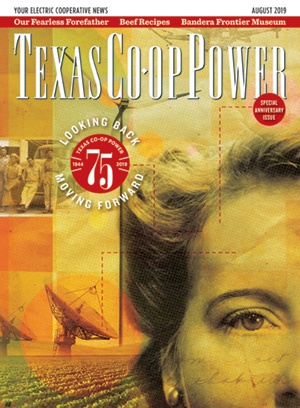He began life a farm boy. He grew into a staunch journalist and rural advocate. After his death, a prestigious journalism award was named for him. The man was George Wilford Haggard, and he created this magazine.
Haggard devoted himself to a life of defending responsible journalism and the rights of rural people who received electricity from cooperatives. Texan political reporter Liz Carpenter described him as a man for whom “rural electrification is his religion.”
Born in 1908 on a farm in Comanche County, Haggard went to study in 1926 at Hardin-Simmons University in Abilene, where he took a job with the Abilene Reporter-News.
Haggard graduated in 1930 and embarked on a career that advanced steadily. He was city editor at the Sherman Democrat and later taught journalism at Abilene High School, leading the school’s student newspaper to international honors.
Eventually, the Texas Farm Bureau hired him to edit its monthly publication. Haggard proved an adept reporter and fearless fighter. After helping quash bills in the Legislature that would’ve crippled public power, he became executive secretary of the bureau.
Haggard’s next venture set the stage for his life’s work: In 1944, he became executive secretary of the Texas Power Reserve Electric Cooperative and editor of its newspaper, Texas Cooperative Electric Power. (Today, we call the association Texas Electric Cooperatives and its magazine Texas Co-op Power.)
Haggard’s dedication to truth was auspicious, as his new position routinely required him to set the record straight. Distortions and manipulations leveled at electric co-ops by the for-profit power industry (and politicians in its pockets) kept Haggard’s rhetoric at prime fighting weight.
He answered preposterous allegations with fundamental cornerstones of the electric co-op message such as: “Co-ops are not tax-exempt. They pay local, school, county and state taxes,” and “For 50 years, private power refused to serve rural areas, claiming it was not practical or feasible. But the farmers themselves are successfully performing the task that the power people said was impossible.”
Haggard’s honest, outspoken integrity was noticed at the national level. In 1948, he joined the Rural Electrification Administration in Washington, D.C., stating his objectives by saying, “We want very much for every co-op member to realize fully that he owns the co-op. He’ll fight for what he owns.” A year later, Haggard was promoted to deputy administrator, the REA’s No. 2 leader.
Sadly, in June 1951, Haggard and five fellow REA employees died in a plane crash outside Fort Collins, Colorado. The tragedy left a gaping hole in the REA roster and morale. U.S. Sen. Tom Connally of Texas summed up the feelings of many national officials with his condolences: “I’m grieved and shocked at the tragedy. I knew and esteemed George Haggard. … His death will be a great loss to the state and the nation.”
In 1958, the National Rural Electric Cooperative Association issued its first George W. Haggard Memorial Journalism Awards recognizing statewide publications that present “lucid, forthright contributions to electric cooperative objectives.” Texas Co-op Power in 2007 took home its most recent award named after its indomitable founder.
Ellen Stader is a writer in Austin. For more on Haggard’s feuds with politicians, read the June 2019 Texas History story The Nylon Campaign on our website.


